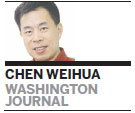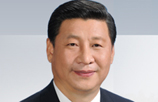Cyber sanctions report downplayed
By Chen Weihua in Washington (China Daily USA) Updated: 2015-09-01 09:50 The State Department is playing down a news report that the Obama administration is developing a package of economic sanctions against Chinese companies and individuals who have benefited from the alleged cybertheft of valuable US trade secrets.
The State Department is playing down a news report that the Obama administration is developing a package of economic sanctions against Chinese companies and individuals who have benefited from the alleged cybertheft of valuable US trade secrets.
The Washington Post, citing anonymous government officials, reported on Monday that the US government has not yet decided whether to issue the sanctions, but a decision is expected soon.
Mark Toner, State Department deputy spokesman, described economic sanctions as a tool in the tool box.
"But I am not saying we're moving forward in that direction," he told the daily briefing Monday. "When we act, we want to make sure that we have compelling evidence to act on."
He noted that the two countries have sharp disagreements on cyberspace rules.
Toner said that the US and China have been meeting to discuss the issues of cybersecurity, adding that this is part of the strategy of diplomatic engagement.
"We also have trade policy tools, other law enforcement mechanisms that we can rely on," he said.
In May 2014, the US Justice Department charged five People's Liberation Army officers of cyber espionage against US companies, resulting in the Chinese side suspending the bilateral working group on cybersecurity.
Toner did not respond directly to a reporter's question about any US cyberhackings into China and other countries. "I am certainly not going to speak to any intelligence activities we may carry out," he said.
Chinese Foreign Ministry spokesman Lu Kang said in June that the US still owes the international community an explanation when it comes to organized cyber surveillance and theft of secrets.
He said it would sound at least more persuasive if the US tells the truth about its own dealings before blindly blaming others.
The revelations made since mid-2013 by Edward Snowden, a former National Security Agency contractor, stunned the world about the aggressive and widespread NSA surveillance in the US and globally, including targeting foreign leaders, corporations and international organizations.
Brazilian President Dilma Rousseff, German Chancellor Angela Merkel, Japanese Prime Minister Shinzo Abe and three French presidents: Francois Hollande, Jacques Chirac and Nicolas Sarkozy all have become US spying targets, according to Snowden and WikiLeaks.
Ted Carpenter, a senior fellow for defense and foreign policy at the Cato Institute, said imposing sanctions would be a counterproductive approach and certainly increases the likelihood of a tit-for-tat, low-intensity trade war.
"Such a confrontation would not improve US-China relations and could lead to permanent damage to the bilateral relationship," he said.
He said instead of a confrontational approach, Washington needs to urge Beijing to do more to curb rogue cyberattacks and see how the two governments might work more closely together to stem such attacks.





